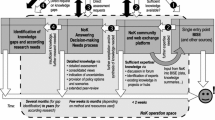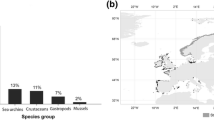Abstract
To respond to the need for a strengthened biodiversity science-policy-society interface at the European level, this paper presents the relevant actors and steps of a knowledge synthesis process relying on a Network of Knowledge. This process aims to maximize active involvement and contribution (including holders of traditional and local knowledge), transparency, credibility, relevance and legitimacy (among other values defined during several workshops held). The presented process allows for the implementation of several synthesis methodologies, depending on the availability of resources, quantity and quality of knowledge and decided according to the expectations of the requesters and users. We put this approach in parallel with other knowledge-based recommendations and negotiation processes such as CBD and IPBES and highlight the need to encompass the diversity of approaches, values, and challenges at the European scale, while the process simultaneously has to be highly flexible, yet simple and robust. Although the presented process still holds several challenges, it offers a step forward in the development and reflections on science-policy–society interfaces, based on consultations with a significant number of the actors from the European policy–science community.



Similar content being viewed by others
Notes
During the conduct of the synthesis the WG may witness limitations, such as access to knowledge or data, or bias in geographical representativeness of results. These are described in a special section in the final report as “Limitations of the answer to the request” to prevent misuse or inappropriate generalisation of the answer.
The interpretation of the mission of JRC regarding its function for the European Commission is likely to change in autumn 2015, due a change in mandate and a reorganisation. So the presented description about the JRC could be considered of limited validity in the near future.
References
Amano T, Sutherland WJ (2013) Four barriers to the global understanding of biodiversity conservation: wealth, language, geographical location and security. Proc R Soc B 280:20122649
Beck S, Borie M, Chilvers J et al (2014) Towards a reflexive turn in the governance of global environmental expertise. The cases of the IPCC and the IPBES. GAIA 23(2):80–87
Bednarek AT, Shouse B, Hudson CG, Goldburg R (2015) Science—policy intermediaries from a practitioner’s perspective: the Lenfest Ocean program experience. Sci Public Policy. doi:10.1093/scipol/scv008
BiodiversityKnowledge (2014) A recommended design for “Biodiversity Knowledge”, a network of knowledge to support decision making on biodiversity and ecosystem services in Europe.” White paper. UFZ, Leipzig
Carmen E, Neßhöver C, Saarikoski H, Vandewalle M, Watt A, Görg H, Young J (2015) Creating a biodiversity science community: experiences from a European network of knowledge. Environ Sci Policy 54:497–504
Carmen E, Watt A, Saarikoski H, Young J (2016) Participation and scale: focusing on learning as an outcome to improve participation at larger scales. Biodivers Conserv
Cash DW, Clark WC, Alcock F et al (2003) Knowledge systems for sustainable development. Proc Natl Acad Sci 100:8086–8091
Cornell S et al (2013) Opening up knowledge systems for better responses to global environmental change. Environ Sci Policy 28:60–70. doi:10.1016/j.envsci.2012.11.008
Diaz S et al (2015) The IPBES conceptual framework—connecting nature and people. Curr Opin Environ Sustain 14:1–16
Dicks L, Walsh JC, Sutherland WJ (2014) Organising evidence for environmental management decisions: a ‘4S’ hierarchy. Trends Ecol Evol 29:607–613
Fairbrass J, Jordan A (2004) Multi-level governance and environmental policy. In: Bache I, Flinders MV (eds) Multi-level governance. Oxford University Press, Oxford, pp 147–164
Görg C et al (2016) The Governance of Science-Policy Interfaces – Network vs. Platform approach. Biodivers Conserv
Hernández-Morcillo M, Hoberg J, Oteros-Rozas E et al (2013) Traditional ecological knowledge in Europe: status quo and insights for the environmental policy agenda. Environ: Sci Policy Sustain Dev 56:3–17. doi:10.1080/00139157.2014.861673
Hoffmann A, Penner J, Vohland K et al (2014) Improved access to integrated biodiversity data for science, practice, and policy—the European biodiversity observation network (EU BON). Nat Conserv 6:49–65
Holmes J, Clark R (2008) Enhancing the use of science in environmental policy-making and regulation. Environ Sci Policy 11:702–711
Hulme M (2010) Problems with making and governing global kinds of knowledge. Glob Environ Change 20:558–564
Kay J, Regier H (2000) Uncertainty, complexity, and ecological integrity: insights from an ecosystem approach. In:Crabbe P, Holland A. et al (eds) Implementing ecological integrity: restoring regional and global environmental and human health, Kluwer, NATO Science Series, Environmental Security pp 121–156
Lynch AJJ, Thackway R, Specht A et al (2015) Transdisciplinary synthesis for ecosystem science, policy and management: the Australian experience. Sci Total Environ 534:173–184. doi:10.1016/j.scitotenv.2015.04.100
Neßhöver C, Ten Brink P, Balian E et al. (2014) Summary report and recommendations on improving the Science-policy interface for biodiversity and ecosystem services in Europe (contract: Ref No 07-0307/2013/661961/SER/B2). http://ec.europa.eu/environment/nature/knowledge/pdf/EU%20Mechanism%20Summary%20Report%202015.pdf
Nesshöver C et al (2016) The network of knowledge approach – improving the science and society dialogue on biodiversity and ecosystem services in Europe. Biodivers Conserv
Opgenoorth L, Faith DP (2014) The intergovernmental science-policy platform on biodiversity and ecosystem services (IPBES), up and walking. Front Biogeogr 5:207–211
Pielke RA Jr (2007) The honest broker—making sense of science in policy and practice. Cambridge University Press, UK, p 188
Pielke RA Jr (2014) The rightful place of science: disasters and climate change. Arizona State University, Tempe, p 124
Pullin AS, Knight TM, Watkinson AR (2009) Linking reductionist science and holistic policy using systematic reviews: unpacking environmental policy questions to construct an evidence-based framework. J Appl Ecol 46:970–975
Pullin AS et al (2016) Selecting appropriate methods of knowledge synthesis to inform biodiversity policy. Biodivers Conserv
Sarkki S, Niemelä J, Tinch R, van den Hove S, Watt A, Young J (2013) Balancing credibility, relevance and legitimacy: a critical assessment of trade-offs in science–policy interfaces. Sci Public Policy 41:194–206. doi:10.1093/scipol/sct046
Schindler S, Curado N, Nikolov S, Kret E, Cárcamo B, Poirazidis K, Catsadorakis G, Wrbka T, Kati V (2011) From research to implementation: nature conservation in the Eastern Rhodopes mountains (Greece and Bulgaria), European Green Belt. J Nat Conserv 19:193–201
Schindler S et al (2016) The network biodiversity knowledge in practice: insights from three trial assessments. Biodivers Conserv
Schuck A et al (2007) Towards a European forest information system. European Forest. Institute Research Reports 20, Brill
Specht A, Gordon IJ, Groves RH, Lambers HG, Phinn SR (2015) Catalysing transdisciplinary synthesis in ecosystem science and management. Sci Total Environ 534:1–3
Sutherland WJ, Burgman MA (2015) Use experts wisely. Nature 526:317–318
Sutherland WJ, Gardner TA, Haider L, Dicks L (2013) How can local and traditional knowledge be effectively incorporated into international assessments? Oryx 48:1–2
Tengö M, Brondizio ES, Elmqvist T, Malmer P, Spierenburg M (2014) Connecting diverse knowledge systems for enhanced ecosystem governance: the multiple evidence base approach. Ambio 43:579–591. doi:10.1007/s13280-014-0501-3
Tittensor DP, Walpole M, Hill SLL et al (2014) A mid-term analysis of progress towards international biodiversity targets. Science 346:241–244
Tremblay M, Vandewalle M, Wittmer H (2016) Ethical challenges in an open system: the network of knowledge's ethical risks assessment and its ethical infrastructure. Biodivers Conserv
UNEP (2013a) Decision IPBES-2/3—procedures for the preparation of the platform’s deliverables. Secretariat of the Intergovernmental Platform on Biodiversity and Ecosystem Services, Bonn
UNEP (2013b) Decision IPBES-2/5—work programme for the period 2014–2018. Secretariat of the Intergovernmental Platform on Biodiversity and Ecosystem Services, Bonn
Van der Sluijs JP, Van Est R, Riphagen M (2010) Beyond consensus: reflections from a democratic perspective on the interaction between climate politics and science. Curr Opin Environ Sustain 2(5):409–415
Wilson DC (2009) The paradoxes of transparency: science and the ecosystem approach to fisheries management in Europe. Amsterdam University Press, Amsterdam, p 303
Young JC, Watt AD, van den Hove S et al. (2013). Effective interfaces between science, policy and society: the SPIRAL project handbook. http://www.spiralproject.eu/content/documents
Young JC, Waylen K, Sarkki S et al (2014) Improving science-policy dialogue to meet the challenges of biodiversity conservation: having conversations rather than talking at one-another. Biodivers Conserv 23:387–404
Acknowledgments
We are grateful for the contributions of our colleagues from the KNEU-consortium as well as to all policy-makers, practitioners and scientists who participated in the consultations. The work presented in this paper has been partly financed by the European Commission via its 7th framework programme. The main development of the BiodiversityKnowledge mechanism was conducted in the KNEU project (Grant No. 265299). I.R.G. was financed by the EU BON project (Grant No. 308454) and contributes to the Labex OT-Med (No. ANR-11-LABX-0061) funded by the French Government through the A*MIDEX project (No. ANR-11-IDEX-0001-02).
Author information
Authors and Affiliations
Corresponding author
Ethics declarations
Conflict of interest
The authors declare that they have no conflict of interest.
Additional information
Communicated by David Hawksworth.
This is part of the special issue on Networking Biodiversity Knowledge.
Rights and permissions
About this article
Cite this article
Livoreil, B., Geijzendorffer, I., Pullin, A.S. et al. Biodiversity knowledge synthesis at the European scale: actors and steps. Biodivers Conserv 25, 1269–1284 (2016). https://doi.org/10.1007/s10531-016-1143-5
Received:
Revised:
Accepted:
Published:
Issue Date:
DOI: https://doi.org/10.1007/s10531-016-1143-5




